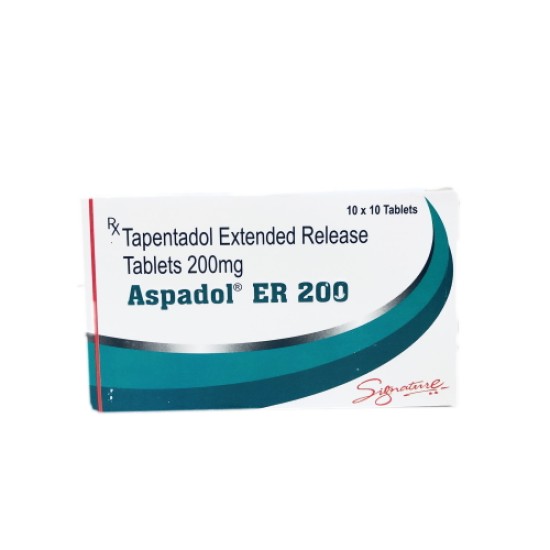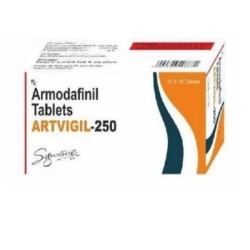Aspadol 200mg (Tapentadol) Treat chronic pain

Aspadol 200mg (Tapentadol) Treat chronic pain
$0.00
- Stock: In Stock
- Brand: Signature Pharmaceuticals
- Model: Aspadol ER 200 mg
- SKU: ASPDL200mg
- Active Ingredient: Tapentadol
- Treatment: Severe Pain
- Alcohol: Do not drink
Available Options
Aspadol 200mg | Powerful Treatment for Chronic pain
Aspadol ER 200 is typically used when other pain drugs fail to provide considerable relief from chronic pain.
Tapentadol, the active ingredient in Aspadol 200 mg tablets, is a narcotic pain medication useful for managing moderate to severe pain of various origins. Headaches, muscle pain, and other forms of physical pain are all reduced. It helps folks relax and enhances their quality of life immediately.
Aspadol 200mg main component, tapentadol, functions by attaching to opioid receptors in the brain and spinal cord to lessen pain perception. Although it should only be used with a healthcare provider's approval, it is occasionally used to control persistent Pain.
What is Aspadol 200mg?
Analgesic medicine tapentadol, also known by the brand name Aspadol 200, is commonly used to treat chronic pain It's also utilized to manage the discomfort of diabetic neuropathy when constant dosing is a necessity. By changing the way the body responds to pain, it does this. The primary ingredient in Aspadol, tapentadol, is widely known for its capacity to diminish both the perception of pain and the body's reaction to it. Tapentadol tablets can help you manage your pain successfully. They are sold both online and in conventional pharmacies.
What is chronic pain?
Every portion of the body can experience chronic Pain that lasts months or years. It disrupts everyday living and can cause worry and sadness. Finding and treating the reason is the first stage in therapy. The best strategy is a mix of medicines, treatments, and behavioral adjustments when that isn't feasible.
Pain that lasts longer than three months or, in many instances, past the usual recovery period is referred to as chronic or lingering Pain. It differs from acute Pain, which manifests rapidly and typically lasts a short time after an accident.
Each individual has a unique experience with a complicated disease known as chronic Pain. Most days, the discomfort, which can be moderate to intense, is felt.
How do people get chronic pain?
Every part of your body can experience chronic Pain, which can take many forms. Among the common forms of persistent Pain are:
There are various kinds of persistent Pain, including nerve pain, Pain brought on by a bone, muscle, or joint disease, and Pain brought on by malignancy.
In addition, chronic Pain can result from injuries, surgeries, or diseases like osteoporosis, arthritis, headaches, and other joint disorders. In some cases, persistent Pain has no obvious cause.
Normally, when a portion of your body is hurt, neurons send messages to your brain, alerting it that something is wrong. The impulses are perceived as discomfort by the brain.
However, neurons that transmit pain impulses to the brain or the brain behave differently in people with persistent Pain. It's possible that the neurons are more responsive than normal or that the brain is misinterpreting other impulses as Pain.
If severe Pain is not addressed or managed properly, it may become a persistent pain problem. The likelihood of Pain becoming persistent increases the longer it goes unchecked.
Types of chronic pains:
- Inflammation discomfort.
- Backache
- Neural agony
- Stiff neck
- Cancer discomfort close to a growth.
- Neuralgia, other headaches.
- Genital discomfort (orchialgia).
- persistent abdominal discomfort
- Chronic Pain in scar tissue,
- Generalized muscle pain
How to Treat chronic pain?
First, discuss with your doctor creating a strategy for controlling your persistent Pain. The strategy presumably includes visits with some medical specialists.
The only way to treat persistent Pain is not with medication. Other therapies, such as self-management, physical exercise, and psychiatric strategies, are necessary if you have persistent Pain.
Chronic pain sufferers who actively control their Pain on a daily basis fare better than those who depend on inactive treatments like medicine or surgery.
Most individuals gain from a variety of therapies and self-management techniques, such as:
A psychotherapist can assist you with physical therapy, exercise, calming methods such as yoga and meditation, bettering your sleep, staying hydrated, and diet monitoring.
Side effects
- Dizziness
- Confusion
- Being unsteady.
- Inhaling shallowly and exhaling
- Muscular rigidity,
- Twitching,
- Decline in cooperation
- Diarrhea, sickness
- Headache,
- Dry tongue
- Itchiness and perspiration
- Seizure
Precautions
An extended-release version of tapentadol, known as Aspadol Er 200mg (Tapentadol ER), treats persistent Pain. It reduces the perception of Pain by attaching to the mu-opioid receptors in the brain and spinal cord.
Adults who require ongoing therapy for a prolonged length of time for mild to severe persistent Pain are prescribed Aspadol 200 (Tapentadol ER). Aspadol Er 200mg (Tapentadol ER) must be taken precisely as a medical expert directs to avoid habituation and potential adverse effects like diarrhea, vertigo, disorientation, and sleepiness.
When a patient is given Aspadol ER 200mg (Tapentadol ER) for the treatment of persistent Pain, their doctor should watch for any indications of drug addiction, abuse, or misuse. While taking this medicine, avoiding booze and other substances that might make you sleepy or have trouble inhaling is essential.
Before beginning therapy, patients should, as with any drug, talk with their doctor about the advantages and disadvantages of Aspadol ER 200mg (Tapentadol ER), particularly if they have a history of substance misuse or addiction, pulmonary depression, or liver or renal disease.
Warnings
If you have any of the following conditions:
- Breathing issues, stomach issues
- MAO drugs were used within the last two weeks.
- Seizures
- Renal or liver issues.
- Keep children's hands out of their grasp.
If you have cardiac, renal, or liver issues, inform your doctor before taking it. While taking this medicine, drinking should be avoided. All other medications you are taking should be disclosed to your doctor because they may affect or be affected by this medication. Before using this medication, pregnant women and nursing mothers should contact their physicians.
FAQs :
Q-1 What is Aspadol 200 mg, and how does it work?
Tapentadol, a narcotic painkiller, is the main component in Aspadol 200mg, a medicine. An analgesic drug used to treat mild to extreme immediate Pain.
Q-2 What is Aspadol 200mg used for?
Aspadol 200mg is used to address mild to extreme Pain in people who need ongoing care for a prolonged period.
Q-3 How should I take Aspadol 200mg?
Take Aspadol 200 milligrams exactly as directed by a medical expert. It is typically ingested for pain relief every 4 to 6 hours, with or without meals.
Q-4 What should I tell my healthcare provider before taking Aspadol Er 200 mg?
If you have a history of pulmonary distress, liver or renal illness, drug misuse, or addiction, inform your doctor before taking Aspadol Er 200mg. Also, inform them of any additional medicines you take, including over-the-counter remedies or natural vitamins.
Q-5 Can I drink alcohol while taking Aspadol 200mg?
Alcohol consumption is not advised if you are taking Aspadol 200 mg because it raises the possibility of adverse effects.
Q-6 What should I do if I miss a dose of Aspadol 200mg?
Aspadol 200mg should be taken as soon as you remember if you skip a dosage. If your next dosage is almost due, ignore the delayed one and take your normal amount as planned. Do not take a second dose to make up for a missed dose.



-250x250w.jpeg)







